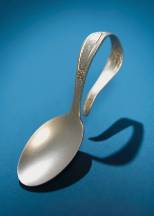Your appointment
Feeding and swallowing consultation information appointments are scheduled over a two day period, usually on a Monday/Tuesday or Wednesday/Thursday.
Oral motor evaluation
 The occupational therapist and speech-language pathologist will talk to you about your concerns about your child's eating and drinking. They will look in your child's mouth and will watch your child eating and drinking.
The occupational therapist and speech-language pathologist will talk to you about your concerns about your child's eating and drinking. They will look in your child's mouth and will watch your child eating and drinking.
Bring the following to the appointment:
- a small variety of foods that your child likes and/or is having particular feeding difficulties with, such as a puree, a soft food, lumpy food, chewing and biting foods (regular foods), and liquids
- any feeding equipment your child regularly uses for meals, such as nipple and bottle, cup, spoon
- positioning equipment (infant seat, seat insert, wheelchair, etc.)
Please try to have your child slightly hungry for the evaluation.
Nutrition evaluation with a dietitian
You will receive food intake records before you come for your child's evaluation. Please fill them in and bring them to the appointment. The dietitian will use the information from these records to help determine if your child's nutritional needs are being met. If your child is using a tube, the dietitian will review his or her tube feeding meal plan. The dietitian will weigh your child and take some measurements to help us know how your child is growing.
Health evaluation
The nurse and/or pediatrician reviews your child's medical history to see if the feeding difficulties are having an effect on his or her health and development. We will ask questions about your child's breathing and/or chest problems, reflux and digestion, muscle tone, and general development.
Videofluoroscopy study (feeding study)
If we are concerned that your child has a problem with his or her swallowing, we will recommend a feeding study. This study occurs in the Radiology Department at BC Children's Hospital with the occupational therapist and the speech-language pathologist from Sunny Hill along with a radiologist. This study involves using a type of x-ray (fluoroscopy) to watch as your child swallows various consistencies of foods and liquids mixed with barium. Your child will be positioned normally using a special adjustable chair.
The study allows us to see how your child manages the food in his or her mouth, whether he or she has any difficulty with swallowing, whether he or she has any food material entering his or her airway (aspiration) and whether we can use techniques such as changing their position or the consistency of their food to help them swallow in a safer manner.
The appointment time, including set-up, may take up to an hour. Exposure time to x-ray is kept as short as possible.
